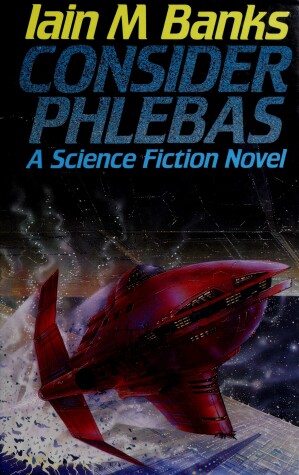Reviewed by Michael @ Knowledge Lost on
Prolific author Iain Banks is known for his literary novels but when he writes his seminal space opera series he uses the pseudonym Iain M. Banks. Sadly Banks lost his battle with cancer on the 9th of June 2013. I realised that I’ve never read anything by this author and since I had Consider Phlebas, I thought this was the place to start; Book One in the Culture series.
I will admit I haven’t read much space opera in the past and I feel like I’ve gone off Science Fiction, well the modern ones at least. I love the old Sci-Fi novels of the 1950’s-1970’s; they blend these futuristic stories with some really interesting philosophical ideas and I miss that type of stuff. When I started reading Consider Phlebas I thought just maybe this will be the series that returns me to those awesome philosophical sci-fi novels. There was some slight philosophical ideas in the novel but that got drowned out by the fast paced plot.
The Culture is a post-scarcity society. A symbiotic society of artificial intelligences (AIs) (Minds and drones), humanoids and other alien species all sharing equal status. We know what aliens and humanoids are but let me quickly explain Minds; these are powerful and intelligent AIs so advance they are self-aware. Almost like a futuristic Skynet but with designs to be treated as equals with the rest of the universe. The Idirans are a major galactic race; they have all the control and want to supress everyone else. They are a deeply religious group who believe in a ‘rational’ God who wants a better existence for his creation. Now that we have explained both sides of the war, feel free to draw the symbolism out of it. Example: The Idirans are Americans, or the Church in medieval times and the Culture are anyone that stands against them. It really is up to you on how you want to interpret this.
The thing I often find hard about these type of Science Fiction and Fantasy novels, is you have to spend so much time trying to work out who each race is and if they represent something relevant to our own history. Once you spent all your time working that out, then you have to write it all down because there are so many you need to reference back to as you go along. Having done that, now you have a slightly better chance at understanding just what the hell is going on with the books. Some people pick this up really easily and just fly through these books fully understanding or just thinking of them as race a, race b and so on. I can’t do that, I want to pull interesting information out of a book and I know that there can be a lot of symbolism in these novels but there is a lot of work involved with working that out before you can even start to read the book.
I feel like I have hit the wall with Science Fiction (I’m not talking about dystopian or post-apocalyptic novels but the Sci-Fi set in space) and maybe I need to read a classic just to get myself out of this rut. As a literary explorer I try these newer Sci-Fi novels in the hopes to find a new and interesting author but most of the time it’s in vain. Don’t get me wrong, once I worked out my own analogy for The Idirans and The Culture I was able to enjoy this book but it feels like too much work. I like working for it while reading but in the cases like Consider Phlebas I think all the work needs to be done before you really start to get into the book and that just doesn’t really appeal to me. Now I’ve worked out a basic idea of this world, I might continue the series. The imagery and the pacing of this book is great and I think Iain M Banks did a great job with it, but I think I might try an Iain Banks book instead; did someone say The Wasp Factory?
This review originally appeared on my blog; http://literary-exploration.com/2013/07/28/book-review-consider-phlebas/
Reading updates
- Started reading
- 2 July, 2013: Finished reading
- 2 July, 2013: Reviewed
